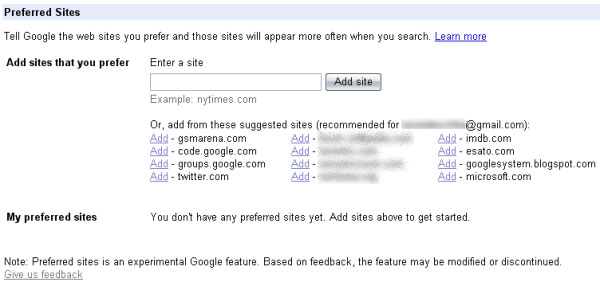 According to Google Operating System, Google is testing a new search customization option for select users called Google Preferred Sites. If you have access to the service, you’ll find the option on your preferences page when logged in (it isn’t turned on for me).
According to Google Operating System, Google is testing a new search customization option for select users called Google Preferred Sites. If you have access to the service, you’ll find the option on your preferences page when logged in (it isn’t turned on for me).
“The preferred sites feature lets you set your Google Web Search preferences so that your search results match your unique tastes and needs,” explains Google on a help page. “Fill in the sites you rely on the most, and results from your preferred sites will show up more often when they’re relevant to your search query.”
When logged in, your preferred sites will show up higher in matching search query results. For example, if you generally want IMDB results to show up first when searching for a movie, you can add IMDB to your preferred list. Or if you want tech articles from SitePoint to show up for relevant queries, you could do the same for this site.
Alex Chitu at Google Operating system lists some other use cases for Google Preferred Sites, including as a partial replacement for bookmarks, and a way to ensure that obscure sites (such as local news outlets) bubble to the top in your searches. However, I’m torn on the potential benefit of this system.

Search personalization has been a hot topic for Google these days. In November Google launched a feature called SearchWiki that allows users to edit search results while logged in by reordering or removing them, or leaving comments on them. (Google Operating System actually reports that Preferred Sites is an extension of the earlier SearchWiki experiment.)
However, I’m skeptical that editing search results is a good thing. Keeping track of your favorite sites is the job of bookmarks, and searching those bookmarks specifically can be done with third party services like deliGoo. Futzing with search results, though, will just create a different experience for every user, and that might not be such a good thing. Not only does personalized search fundamentally alter the practice of search engine optimization, it makes helping your peers find something online a more difficult prospect. “Just search for it on Google,” doesn’t work as well when everyone’s Google results are different.
On the other hand, Chitu’s use cases for Preferred Sites do make a lot of sense. When I search for a movie on Google, for example, I generally am looking for quick links to a handful of sites — IMDB, Wikipedia, Rotten Tomatoes — adding those to Google Preferred Sites would ensure they come up first.
What do you think? Is Preferred Sites a good idea or a bad one? Let us know in the comments.
 Josh Catone
Josh CatoneBefore joining Jilt, Josh Catone was the Executive Director of Editorial Projects at Mashable, the Lead Writer at ReadWriteWeb, Lead Blogger at SitePoint, and the Community Evangelist at DandyID. On the side, Josh enjoys managing his blog The Fluffington Post.
